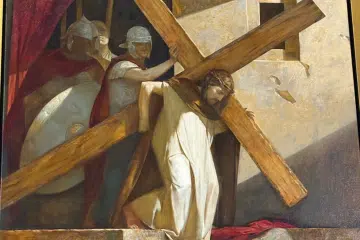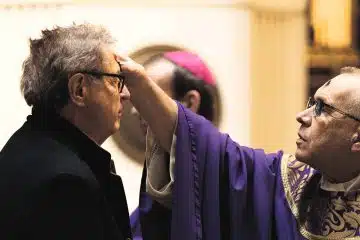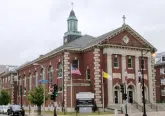Harvard Catholic Center responds to ‘spin’ on atheist chaplain
by Joe Bukuras
Washington D.C., Aug 31, 2021 / 11:04 am
The Harvard Catholic Center on Monday clarified reports of the university’s new atheist “chief chaplain,” saying the position is administrative and will not affect the center’s Catholic mission.
Last week the New York Times announced that Greg Epstein, an atheist and humanist chaplain at Harvard University, was elected as the “chief chaplain” of the Harvard Chaplains, the association of more than 40 chaplains serving Harvard students of various religious denominations.
Epstein heads the school’s humanist chaplaincy, which represents humanists, agnostics, and atheists. The Times reported his work as “reflecting a broader trend of young people across the United States who increasingly identify as spiritual but religiously nonaffiliated.”
“His role is not as the chief chaplain,” said Nico Quesada, marketing and media director at the Harvard Catholic Center, to CNA on Monday. “It is actually as the president of the Harvard Chaplains.”
Quesada told CNA that Epstein’s role as president of the university’s chaplains will be purely administrative.
“There really is no influence in the role other than the fact that he has the title as the president as the Harvard Chaplains and that he’s the liaison between that group and the president of Harvard,” Quesada said. He added that Epstein, in his new role, “is just carrying on the message from the Harvard Chaplains to the president of Harvard,” and is “under watch of his colleagues.”
Another of Epstein’s duties will be to convene all the chaplains when they have matters to discuss, Quesada said.
“So he’s representing the entire group but he’s not representing his own opinions if that makes sense.”
The Harvard Catholic Center is the chaplaincy to the university’s Catholic students, based at nearby St. Paul’s parish in Cambridge, Massachusetts. It is staffed by three priests serving as part of the university’s chaplains’ association.
Quesada told CNA that, following reports of Epstein’s new role as president, the Catholic center received many emails asking if he would have a leading role in the Catholic chaplaincy. He also said some people thought the university was “forcing him upon us [the center], which is not the case.”
These misconceptions, Quesada said, prompted the Catholic center’s Aug. 29 statement responding to “spin” in news reports.
Epstein was unanimously approved to the chaplain facilitator position by members of the chaplains’ association, including the Catholic chaplains. Before he was unanimously elected, Epstein was nominated for the role by a chaplain committee which did not include the Catholic chaplains, Quesada explained.
Back in April, the Harvard Catholic Center had some concerns about “the overall message that his [Epstein’s] election would send,” Quesada said. However, the center recognized the administrative nature of the role, and thought it would not impact matters of religious life on campus.
Quesada said that the chaplain president term lasts for one year, but is sometimes extended by a year for courtesy purposes. Catholic Chaplains have held the role as president in the past, he noted.
According to the Huffington Post, Epstein previously served as the vice president of the university chaplains’ association.
Quesada said that there never has been a “chief chaplain” at Harvard. “It’s just an organization of over 40 different chaplains and that’s why they elect the individual which rotates every year, so every faith can have an equal voice,” he told CNA.
In its Aug. 29 statement, the Harvard Catholic Center said that “we are happy to restate our commitment to proclaim here at Harvard and beyond that Jesus Christ is Lord, most fully revealed in the Catholic Church.”
The Harvard Christian Alumni Society also published a statement noting the “minor part time role” of Epstein’s “short-term rotating position.”
“This was not a top-down appointment but a bottom-up vote choosing one rotating representative from a group of peers,” the group stated. “Previously this role has been filled by chaplains of various backgrounds including Christians and Muslims.”
Epstein has served as a university chaplain since 2005, the group noted, and “has made it clear that he believes Christians should have a seat at the table.” The society added that Epstein “has invited Christian chaplains to speak to his group” and has helped co-host debates between Christian and secular students.
Epstein was the national chair of Humanists for Biden during the 2020 election, leading the group’s advisory council to Biden’s presidential campaign on behalf of “humanists, atheists, agnostics, and others.”
He has also authored the book, “Good Without God: What a Billion Nonreligious People Do Believe.” The book was written as a response to prominent atheists on humanism.
“We don’t look to a god for answers,” Mr. Epstein said in his interview with the Times published on Aug. 26. “We are each other’s answers.”
On his chaplaincy web page, Epstein’s special interests include “ethics in technology; meaning and purpose beyond religion; existentialism and humanism in literature and popular culture; developing healthy masculinity from a feminist perspective; secular humanistic Judaism; racial justice and healing; the philosophy and practice of interfaith work.”
Epstein also serves as humanist chaplain at the Massachusetts Institute of Technology.
The goal of the Harvard humanist chaplaincy, as stated on the university’s website, is to create “a new model for how humanists celebrate life, promote reason and compassion, and better the world for all.” The chaplaincy aims to foster community among atheists, agnostics, and “allies.”
“Humanism is a progressive life stance that, without supernaturalism, affirms our ability and responsibility to lead ethical lives of personal fulfillment, aspiring to humanity’s greater good,” the page explains.
According to Epstein’s 2013 interview on Harvard’s YouTube page, the humanist chaplaincy at Harvard was founded by former Catholic priest Tom Ferrick. Epstein said that Ferrick eventually lost his belief in God through encounters with students at Dartmouth College while serving as an assistant chaplain there.
“The students talked him right out of believing in God,” Epstein said. “He also realized that he was a gay man and that was a bit of a challenge in a Catholic setting.”
“What finally set him over the edge was the Vatican II’s decision…not to allow contraception. He just couldn’t, from an ethical point of view, stand that idea,” Epstein said of Ferrick. “It wasn’t compatible with his view of an ethical world.”
Joe F. Gerstein, a man described as one of Ferrick’s longtime friends, said that Ferrick was eventually excommunicated from the Church, according to an interview with the Harvard Crimson, Harvard’s college newspaper. Epstein took over the humanist chaplaincy following Ferrick’s death.













